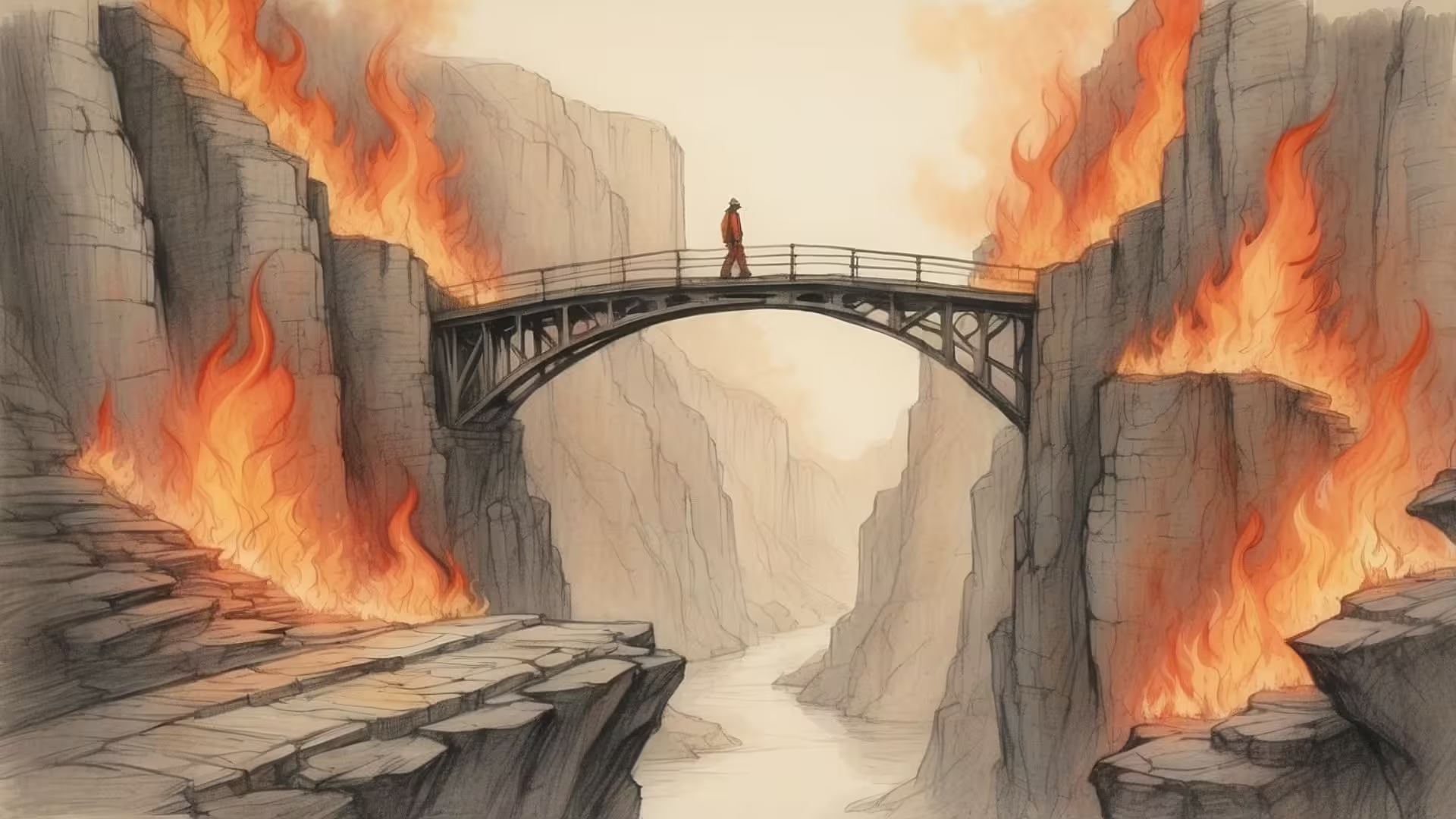- The Gist
- What Does Burn Bridges Mean?
- The Origin and Evolution of the Phrase
- Examples of Burning Bridges in Everyday Life
- When Burning Bridges Might Be Necessary
- The Risks of Burning Bridges
- Finding a Balance: Knowing When to Walk Away Gracefully
- Should You Burn Bridges or Keep Them Intact?
- Let’s Talk
- Let’s Learn Vocabulary in Context
The Gist
What Does Burn Bridges Mean?
“Burn bridges” is an idiom that refers to intentionally ending a relationship or connection in a way that makes it difficult or impossible to restore. The phrase often carries a negative connotation, implying that the person has acted in a way that leaves no room for reconciliation. It can apply to personal relationships, professional ties, or even places we leave behind for good. Essentially, it means cutting off any possibility of going back.
The Origin and Evolution of the Phrase
The expression comes from military history, where soldiers would burn bridges behind them to prevent retreat, forcing their troops to move forward. In this context, it symbolized a point of no return—there’s no way back, only forward. Over time, the phrase has evolved into an idiom used to describe behavior that cuts off connections, often with a sense of finality or regret.
Examples of Burning Bridges in Everyday Life
One of the most common examples of burning bridges happens in the workplace. Imagine someone leaving a job but doing so by criticizing their boss and coworkers publicly. That person has burned their professional bridge—making it unlikely that they could ever return to that company or receive a glowing recommendation. The same can happen in friendships. Ending a relationship with harsh words or actions might feel satisfying in the heat of the moment, but it often leaves permanent damage that’s hard to repair.
Burning bridges can also apply to personal habits or lifestyles. Think of someone who decides to quit smoking and throws away all their cigarettes, lighters, and ashtrays. In this case, burning bridges might serve a positive purpose—it makes going back to old habits more difficult, encouraging a fresh start.
When Burning Bridges Might Be Necessary
Although burning bridges often carries a negative tone, there are situations where it can be the right decision. In toxic relationships or harmful environments, cutting ties completely can be necessary for personal growth and mental well-being. In these cases, burning bridges isn’t about being reckless—it’s about creating boundaries and protecting yourself from situations that no longer serve you. Moving forward without looking back can be a powerful way to reclaim your life and focus on healthier connections.
The Risks of Burning Bridges
While it might feel good to burn a bridge in the moment, it’s important to weigh the consequences. In professional settings, for example, burning bridges could limit your future opportunities. The world is smaller than we think, and you never know when a burned connection might come back into play—whether it’s through networking, references, or unexpected encounters. Even in personal relationships, burning bridges can leave behind feelings of regret. Once the damage is done, rebuilding a connection can be difficult, if not impossible.
Finding a Balance: Knowing When to Walk Away Gracefully
Not every exit needs to involve a burned bridge. In many cases, it’s better to leave relationships, jobs, or commitments on good terms. Even if you’re sure you won’t return, maintaining respect and professionalism keeps your options open. Instead of slamming doors, you can close them gently—leaving room for positive interactions down the road. A graceful exit shows maturity and ensures you leave with your reputation intact, which can be valuable in both personal and professional life.
Should You Burn Bridges or Keep Them Intact?
The decision to burn bridges is never easy, and it’s not one to take lightly. While some situations may call for it—especially if they’re toxic or harmful—many times it’s wiser to leave doors open. Life is unpredictable, and the connections we make today can impact us in ways we don’t expect. The key is knowing when it’s time to move on and how to do so in a way that reflects the person you want to be. So, before you strike that match, ask yourself: Will this bridge be worth crossing again someday? Because once it’s burned, there’s no going back.
Let’s Talk
Burning bridges—it’s one of those things that sounds dramatic, but let’s be honest, we’ve all been tempted to do it at some point. Maybe it’s that annoying coworker who just won’t stop undermining you, or a friendship that’s more toxic than supportive. In those moments, it can feel like the most satisfying thing in the world to just cut ties and walk away with a mic-drop exit. But then reality kicks in, and you start wondering—was that really the best move? Because once you burn a bridge, there’s no going back, and life has a funny way of looping back to people and places you thought you left behind for good.
One thing we didn’t dive into earlier is how burning bridges isn’t just about dramatic exits. It can happen in subtle ways too. Think about that time you left a project unfinished or quit a team without notice. You might not have meant to burn a bridge, but those actions can still leave a sour taste for the people involved. The tricky thing about bridges is that they aren’t always obvious—sometimes you don’t even realize you’ve burned one until you need to cross it again, and oops, it’s already in ashes.
But let’s talk about the flip side—are there times when burning bridges might actually be the healthy thing to do? Absolutely. If you’re in a situation that’s hurting you—whether it’s a toxic workplace, an unhealthy relationship, or even a bad habit—closing that door firmly behind you can be necessary. The key is doing it with intention. It’s one thing to set fire to a bridge in a moment of anger, and it’s another to calmly say, “This chapter is closed, and I’m not coming back.” There’s a power in that kind of decision—it’s not about being reckless but about knowing your worth and making space for better things.
Here’s the thing: life is unpredictable, and we never really know which connections will matter down the road. That’s why burning bridges can be such a gamble. You might leave a job thinking, “I’ll never need anything from these people again,” only to find out a few years later that one of your old coworkers is in charge of hiring at your dream company. It makes you wonder—how often do we let pride or frustration push us into decisions we might regret later?
I think the real lesson here is about balance. Not every connection is meant to last forever, and that’s okay. Some bridges aren’t worth keeping—they’re unstable and dangerous to cross. But others might just need a little maintenance. Maybe instead of burning a bridge, the answer is to step away gracefully, leaving things on good terms. Even if you never go back, it’s nice to know you could if you wanted to.
So, what about you? Have you ever burned a bridge and later wished you hadn’t? Or maybe there’s a bridge you held on to that ended up being more valuable than you expected? It’s worth thinking about because the way we exit situations can say a lot about who we are and who we want to become. Sometimes the hardest part isn’t knowing when to burn a bridge—it’s knowing when to leave it standing.
Let’s Learn Vocabulary in Context
Let’s explore some of the key vocabulary from our conversation about burning bridges and see how these terms can fit into real-life situations. First up is burn bridges. This phrase doesn’t involve actual fire—it’s a metaphor for ending a relationship or situation in a way that makes it impossible to return. It carries a sense of finality. You might say, “I burned bridges with my old boss by quitting without notice, and now I can’t use them as a reference.” It’s useful anytime you want to describe cutting ties, especially when the exit isn’t exactly smooth.
Next, we have cut ties, which is closely related to burning bridges. This phrase means to end a connection, but it doesn’t always have the same negative vibe. You can cut ties without all the drama—just a clean break. For example, “I decided to cut ties with that business partner because we had different goals.” It’s often about moving forward without carrying old baggage.
Mic-drop exit is another fun one. This phrase comes from the idea of someone making a bold statement, dropping the mic, and walking away without saying another word. In the context of burning bridges, a mic-drop exit is when you leave a situation with flair, but not always with tact. It might feel great at the moment—like saying exactly what’s on your mind to a bad boss—but it doesn’t leave room for reconciliation. You could use it in casual conversation, too: “She left the group chat with a mic-drop exit after the argument got heated.”
Let’s not forget toxic relationship. This term describes a relationship—whether personal or professional—that is harmful and draining. It’s the kind of relationship where burning bridges might actually be the right move. For example, “I had to burn bridges with that friend because it was a toxic relationship that affected my mental health.” It’s a useful phrase when you need to describe connections that do more harm than good.
Pride also came up as a potential factor in burning bridges. Pride, in this sense, refers to an inflated sense of self that can make us act stubbornly or refuse to apologize, even when it’s the right thing to do. In real life, you might say, “I let my pride get in the way, and now I’m not sure how to fix things.” It’s a reminder that sometimes, holding on to pride can cost us important relationships.
And finally, graceful exit is the opposite of a mic-drop exit. It means leaving a situation on good terms, even when things aren’t perfect. A graceful exit keeps the door open for future connections. In practice, it looks like leaving a job with a polite resignation letter and a thank-you note, even if you didn’t enjoy your time there. You might say, “I didn’t love the project, but I made a graceful exit to keep my options open.”
So, here’s something to think about: Can you recall a time when you had to cut ties or make a graceful exit? How did it affect your relationships afterward? And do you think there are situations where burning bridges might be the best option, or is it always better to leave things on good terms? It’s worth reflecting on because the way we exit situations says a lot about how we manage our relationships and ourselves.










0 Comments